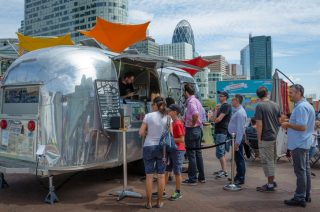The extent of a “feasibility study” conducted to prove the economics of a business that was ultimately abandoned by its buyers, was at the core of a District Court dispute in which the buyers sued to recover their investment.
 In June 2010 Iain and Kristy Brotherson expressed their interest to Brian Smallwood about purchasing a mobile coffee van franchise.
In June 2010 Iain and Kristy Brotherson expressed their interest to Brian Smallwood about purchasing a mobile coffee van franchise.
A key selling point – the buyers had young children and were leaving had secure jobs in Canberra earning about $100k per annum – was the “feasibility study” that Smallwood claimed to have performed involving the collection and examination of data for the prospective mobile café territory.
Smallwood told them that his company’s feasibility studies for Lismore and Ballina were “so good he could put three vans into the territory”. He went on to say “there was only one van there at the moment which was the sale and nobody knew of it”.
The results “were so good,” he said, “he was only willing to give them half of Lismore as their territory”.
They decided to buy the van and the Lismore Espresso To Go Mobile Café franchise at a cost of $135k, including a $30k surcharge for the “100 Cup Guarantee” whereby the franchisor guaranteed a “turnover of 100 cups a day”, prior to business handover.
Iain and Kristy calculated they needed to sell 150 cups a day to match their income from the jobs they left behind.
The business was never successful and ultimately was abandoned. The franchisee sued, alleging they had been misled and deceived by various representations that enticed them to enter into the agreement.
In the course of the 5 day trial, it was revealed that Smallwood’s “feasibility study” entailed “an internet search” to estimate the total number of Lismore businesses, a short visit there to “call on a number of businesses” and the application of a confidential “mathematical formula”.
The “formula” – which Smallwood was reluctant to reveal not because it was a “wonderful trade secret but because it was embarrassingly rudimentary” – was his unsubstantiated proposition that 350 businesses would support one mobile café run.
The court was scathing of the absence of data in the “study” concerning the concentration of customer businesses, the number of staff therein, the demographic profiles of the prospects, the typical hours worked and the location of competitors. There was no evidence of any mathematical calculation of turnover or growth.
The so-called “feasibility study” was “manifestly fatuously superficial” and the representation concerning it, was therefore misleading and deceptive.
But the international coffee van franchisor counterclaimed, alleging the Brothersons had repudiated the agreement by abandoning the franchise before it had been sufficiently developed. Had this not occurred, the business would eventually have been successful and no losses incurred.
True, the franchisee never developed the business to the point where there was a day on which 100 cups were sold, because they became desperate: “It did not appear to be working, they were going backwards, they felt they were being abandoned”.
The court found in their favour, concluding that no amount of persistence would have made the business a success: “Lismore was just not a suitable site for the business. The two existing vans were meeting all the demand that existed there”.
Damages were awarded against the franchisor in the sum of $203,000.
Brotherson v Hursle Pty Ltd [2013] QDC 257 Brisbane McGill SC DCJ 16/10/2013




0 Comments